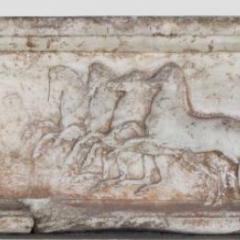New research from UQ Greek history expert Associate Professor David Pritchard puts the study of war in the culture of classical Athens on an entirely new footing.
Historically, a funeral speech was delivered for dead combatants almost every year in classical Athens, but Dr Pritchard’s findings show there was much more to this tradition.
Published by Cambridge University Press, The Athenian Funeral Oration: After Nicole Loraux is the first major study of this prestigious genre in more than 40 years.
The famous funeral speech of Greek politician and general during the Golden Age of Athens, Pericles, has played striking public roles in English-speaking countries.
His moving words are still engraved on war memorials or other public buildings around the world - including The University of Queensland’s very own Forgan Smith building.
“For we are both thrifty lovers of beauty and lovers of wisdom without softness is inscribed on the entrance to the oldest surviving building at UQ and original Faculty of Arts,” Dr Pritchard said.
The Invention of Athens by Nicole Loraux was the first book-length study of the speech that democratic Athens staged for the war dead and before this book’s publication in 1981, ancient historians had accorded little importance to the funeral oration.
“Loraux’s boldest claim was that the funeral oration had a significant impact on political debates about war and peace.
“But she simply never undertook the comparison of this genre and surviving political speeches that was required to put this claim beyond doubt,” he said.
The Athenian Funeral Oration: After Nicole Loraux brings together top-ranked experts to finish Loraux's book.
“Our book dedicates a chapter to each extant funeral speech in order to answer the important questions that Loraux left unanswered.
“What emerges is a speech that had a much greater political impact than Loraux originally thought,” Dr Pritchard said.
The book also provides a rich analysis of war’s overall place in the culture of democratic Athens.



